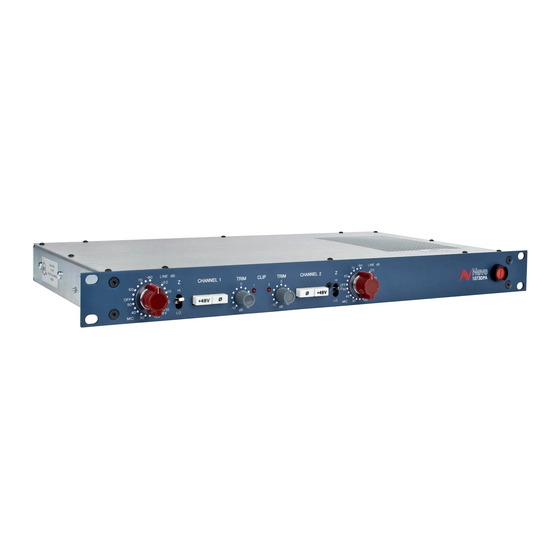AMS Neve 1073DPA Gebruikershandleiding - Pagina 7
Blader online of download pdf Gebruikershandleiding voor {categorie_naam} AMS Neve 1073DPA. AMS Neve 1073DPA 10 pagina's. Mic pre-amplifier

1073DPA & 1073DPD Mic Pre-Amplifier
The ADC is set up to output 0dBFS with +26dBu at the Line Output or Insert point but can be
changed to output +18dBu for 0dBFS. See page 6 for change information.
Sampling Frequency
The left hand FORMAT switch selects the 44.1kHz PCM range, the 48kHz PCM range or DSD. The
right hand SAMPLE RATE switch selects which multiple of sampling rate to use e.g. 48, 96 or
192kHz.
With 44.1kHz selected the multiple LEDs illuminate red, with 48kHz range selected the multiple
LEDs illuminate green. Selecting DSD only allows 44.1kHz sync (the multiple LEDs are all off).
Sync Inputs
The 1073DPD has two sync inputs; AES3 on a female XLR and wordclock on a chassis BNC. If
neither Sync Input is present the unit will synchronise to it's internal crystal clock. If one or other sync
input is present at the correct sampling frequency selected on the front panel the LED (AES or WCLK)
will illuminate green showing that the sync input is being used as a reference. If both sync inputs are
present and correct the wordclock input will be used as reference. Normally the sync input is set to
the required sample rate. In this case both AES OUT 1L and AES OUT 2R carry the same stereo AES
signal converted from the left and right analogue inputs.
Double Rate AES Output
It is also possible to select 96kHz (or 88.1kHz) sampling rate with a 48kHz (or 44.1kHz) sync input.
Similarly it is possible to select 192kHz (or 176.2kHz) sampling rate with a 96kHz (or 88.1kHz) sync
input. This will cause the unit to output double rate AES on the two output AES connectors. The sync
LED will still illuminate green indicating the sync reference is still being used for the digital output
even though the ADC is sampling at twice the sync input sampling rate. In this situation AES OUT 1L
carries the odd and even samples of the left audio double rate signal on its Left and Right digital
channels respectively. Similarly, AES OUT 2R carries the odd and even samples of the right audio
double rate signal on its Left and Right AES channels.
DSD
Selecting DSD will default to 44.1kHz reference. If no sync is available it will use the internal crystal
reference.
The interface requires a minimum of two BNC cables (DSD L and DSD R) to the DSD DAC.
The DSD output is switchable between SDIF2 and SDIF3 with the rear panel dip switch. SDIF2
requires a 44.1kHz sync signal to be passed to the DAC and this should preferably come from the
1073DPD sync output via a third BNC cable. SDIF3 transmits the DSD signals with clock
information included and should not need the sync signal.
Refer to your DAC for compatibility information.
Issue 3
User Guide
Page 5
